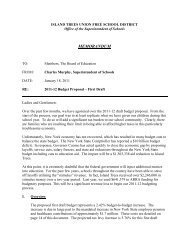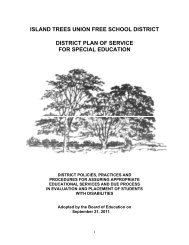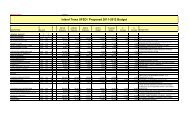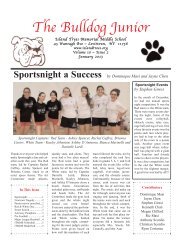Dear Incoming 10 Grade Student, We are excited to share this year's ...
Dear Incoming 10 Grade Student, We are excited to share this year's ...
Dear Incoming 10 Grade Student, We are excited to share this year's ...
Create successful ePaper yourself
Turn your PDF publications into a flip-book with our unique Google optimized e-Paper software.
“Now it’s time <strong>to</strong> relax,” she said.<br />
Life will soon resume an air of normalcy. A day after Intel announced its semifinalists,<br />
Suffolk County officials said they had found a home for the Garveys.<br />
Ms. Garvey said the best part of the past couple of weeks was <strong>to</strong> “hopefully inspire the<br />
people who heard what I had <strong>to</strong> say.” On the flip side, she said, “the worst thing is the<br />
lack of sleeping.”<br />
The Garveys may finally move in<strong>to</strong> their new home <strong>this</strong> weekend, and Ms. Garvey said<br />
she hoped <strong>to</strong> get back <strong>to</strong> the labora<strong>to</strong>ry and her mussels next week.<br />
ARTICLE #2: THE WORKING POOR ARE NOT GETTING BY IN AMERICA<br />
The Working Poor Are Not Getting By in America<br />
Poverty, 2012<br />
"Despite working hard, <strong>to</strong>o many American families <strong>are</strong> struggling <strong>to</strong> get by, advance <strong>to</strong><br />
the middle class and provide a secure future for their children."<br />
In the following viewpoint, the Working Poor Families Project asserts that many lowincome<br />
working families struggle and do not earn enough for financial security. Working<br />
for poverty-level wages and inadequate benefits, adults in these households, the project<br />
claims, pay much greater portions of their salaries <strong>to</strong> rent, <strong>are</strong> much less likely <strong>to</strong> have<br />
health insurance, and do not have the skills and education <strong>to</strong> succeed in the current<br />
economy. Therefore, the project recommends that federal policies advance the skills of<br />
working adults and help low-income families meet their basic needs. The Working Poor<br />
Families Project is a national initiative that advocates for low-income working families.<br />
As you read, consider the following questions:<br />
1. How does the project address the myth that low-income working families do not work?<br />
2. What national figures does the project cite for working adults and their education and<br />
skills?<br />
3. What were the numbers of low-income working families in the United States in 2006,<br />
as stated by the project?<br />
America's low-income working families typically include men and women who work as<br />
cashiers, cus<strong>to</strong>dians, child c<strong>are</strong> workers, health c<strong>are</strong> aides and security guards—workers<br />
who constitute the backbone of an increasingly service-based economy. They work hard,<br />
pay taxes and strive <strong>to</strong> achieve a brighter economic future for their families. But they lack
















